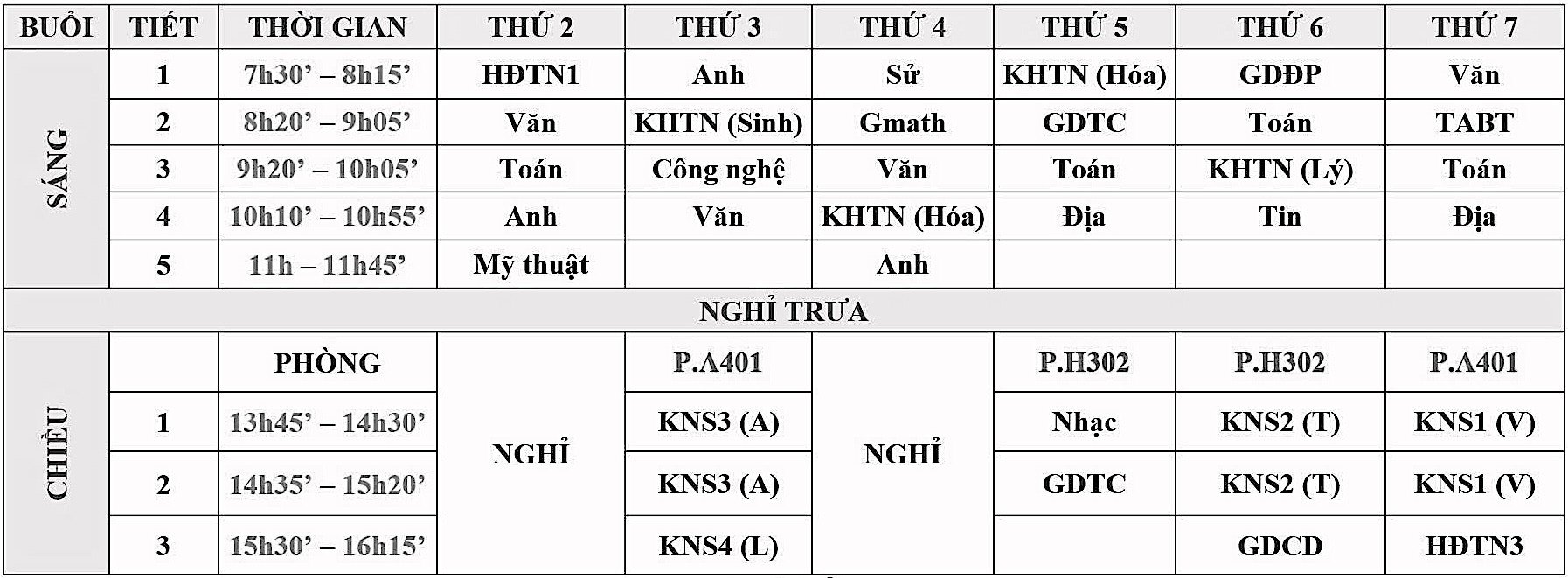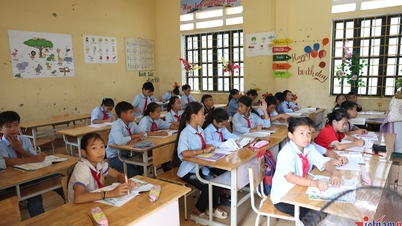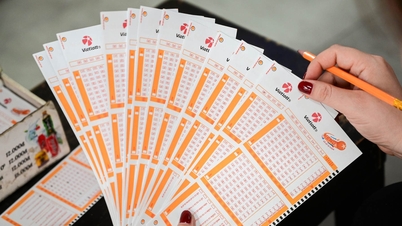In the 2025-2026 school year, general schools across the country will begin to organize two-session teaching when qualified, in which the study time is limited to no more than 7 periods/day for primary school, a minimum of 9 sessions/week, each period 35 minutes. Middle and high school levels will also have no more than 7 periods/day, a maximum of 11 sessions/week, each period 45 minutes.
This regulation "aims to reduce academic pressure for students", but in reality, it has caused many problems, making many parents and schools confused.
Students do not get two full days off on the weekend.
Ms. Minh Ha, whose child is studying in secondary school in Hanoi , said that according to the schedule, this school year, her child has two afternoon classes and finishes school at 3:20 pm. Meanwhile, both she and her husband have to work until 5:30 pm and cannot come home in the middle of the day to pick up their child.
This mother said that when the school implemented the policy of studying 2 sessions/day, students should have only had to go to school from Monday to Friday. But now, her child has to go home early during the week and also has to go to school on Saturday.
“Thus, my child hardly has a full day off. Not to mention, this also disrupts family life and makes it difficult for parents to arrange their work,” she said indignantly.

Ms. Thu Huyen, a parent of an 8th grader in Hanoi, said that compared to last year, her son’s study time has increased by 4 periods per week. In addition, he has 4 extra afternoon classes, including 2 2-period classes, 2 3-period classes and the earliest end time is 3:30 p.m.
In case parents have to work and cannot come home in the middle of picking up their children, they can register for an additional life skills class.
“It is called a life skills class, but in reality the teacher will give out math and Vietnamese homework for the children to do, the fee is 350,000 VND/month/subject. Actually the cost is not too high, but at night the children still have to do a lot of homework. The children are tired, the parents are also tired, there is not enough time to study deeply and improve,” said Ms. Huyen. She hopes that Hanoi will follow Ho Chi Minh City, not letting students go to school on Saturdays, helping the children have a full two-day weekend off.
'You may not learn on Saturday, but there are still many difficult things'
Ms. NTMH, principal of a primary school in Hanoi, said that with current regulations, students in many schools in Hanoi will have to finish school at 3:30-4:30 p.m. To make it easier for parents to pick up and drop off their children, the school has arranged additional activities such as STEM, sports , arts, life skills, etc. However, according to her, this is a voluntary activity, not all parents register their children to participate.
"There are classes with only about 1/3 of the students registered, so it is very difficult for the school to manage the remaining students if their parents cannot come to pick them up," she said.
In addition, the principal said that if there is no class on Saturday, the school will face pressure in rearranging teachers and classrooms.

Meanwhile, the leader of a secondary school in Dong Da said that schools that have the conditions to implement two-session/day learning can completely arrange "hard" lessons in the program along with supplementary and extracurricular activities on weekdays.
This person cited that in her school, 6th and 7th graders will study 29 periods/week, 8th and 9th graders study about 29.5 periods/week. Including activities, clubs, enrichment classes, extracurricular activities, experiences... the total number of periods will be about more than 30.
“Thus, students only need to study 2 sessions/day from Monday to Friday to still meet the 30-35 hours of the program. For the rest, schools can be flexible in organizing other activities without having to extend to Saturday,” said the principal.
However, she also said that the biggest problem of most schools in the inner city is the physical facilities. She stated the reality: “My school has 42 classes but only 22 classrooms. If all classes study 2 sessions/day, the school will not have enough rooms to arrange.
Therefore, each class is only allowed to study 2 afternoons per week. This is the reason why many schools, especially those in the inner city, are forced to maintain Saturday classes to have enough time for the program," she said.
In Ho Chi Minh City, in response to the public outrage over parents having to pick up their children too early, the Ho Chi Minh City Department of Education and Training quickly made adjustments, requiring schools not to close before 4 p.m. or after 5 p.m., and to stop classes on Saturdays. In addition, schools can flexibly arrange their timetables and have more than 7 classes per day.
Explaining this content, Mr. Nguyen Bao Quoc, Deputy Director of the Department of Education and Training of Ho Chi Minh City, said that the guidance of the Ministry of Education and Training is applied to the main curriculum. For the second session activities, the school can proactively arrange to exceed this number of periods.
Therefore, principals at schools in Hanoi hope that, like Ho Chi Minh City, Hanoi will soon make adjustments to help schools flexibly arrange more than 7 classes per day.

Source: https://vietnamnet.vn/hieu-truong-than-kho-khi-xep-lich-hoc-toi-da-7-tiet-ngay-2441988.html


![[Photo] Solemn opening of the 12th Military Party Congress for the 2025-2030 term](https://vphoto.vietnam.vn/thumb/1200x675/vietnam/resource/IMAGE/2025/9/30/2cd383b3130d41a1a4b5ace0d5eb989d)
![[Photo] Panorama of the cable-stayed bridge, the final bottleneck of the Ben Luc-Long Thanh expressway](https://vphoto.vietnam.vn/thumb/1200x675/vietnam/resource/IMAGE/2025/9/30/391fdf21025541d6b2f092e49a17243f)

![[Photo] President Luong Cuong receives President of the Cuban National Assembly Esteban Lazo Hernandez](https://vphoto.vietnam.vn/thumb/1200x675/vietnam/resource/IMAGE/2025/9/30/4d38932911c24f6ea1936252bd5427fa)
![[Photo] The 1st Congress of Phu Tho Provincial Party Committee, term 2025-2030](https://vphoto.vietnam.vn/thumb/1200x675/vietnam/resource/IMAGE/2025/9/30/1507da06216649bba8a1ce6251816820)
![[Photo] General Secretary To Lam, Secretary of the Central Military Commission attends the 12th Party Congress of the Army](https://vphoto.vietnam.vn/thumb/1200x675/vietnam/resource/IMAGE/2025/9/30/9b63aaa37ddb472ead84e3870a8ae825)


































































































Comment (0)